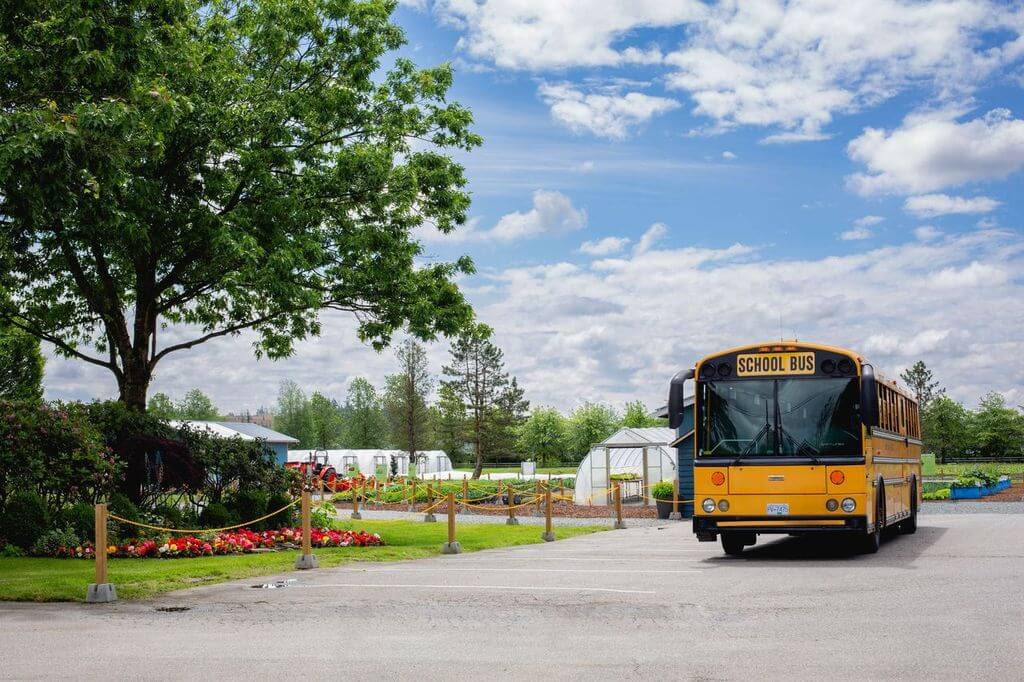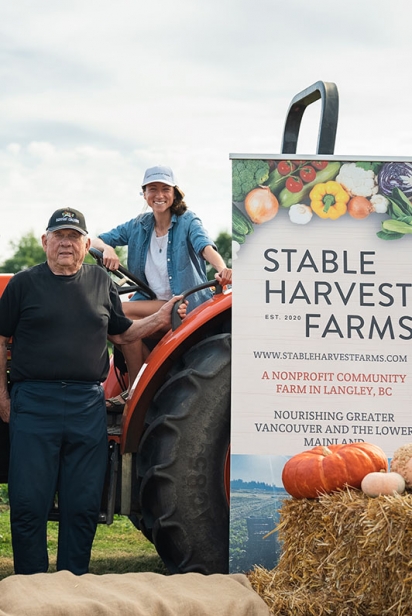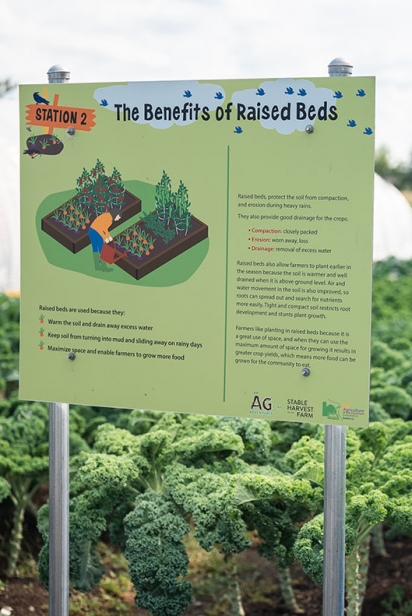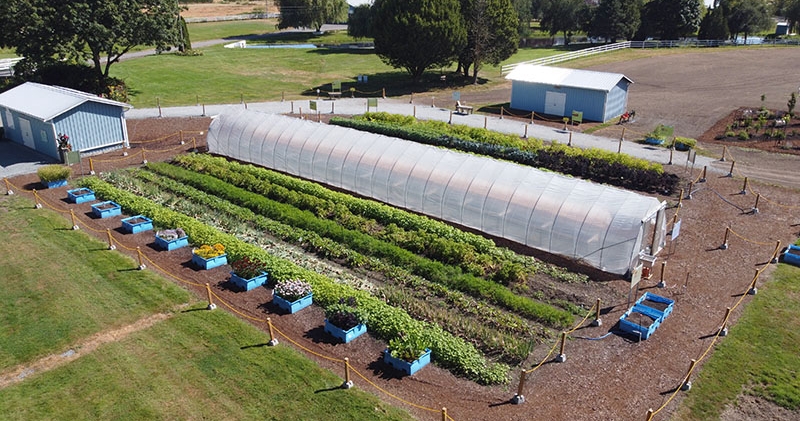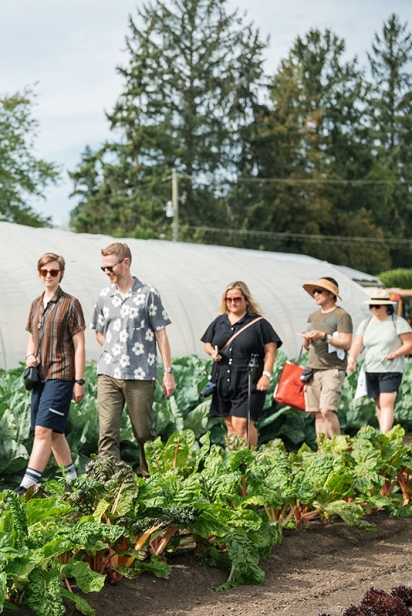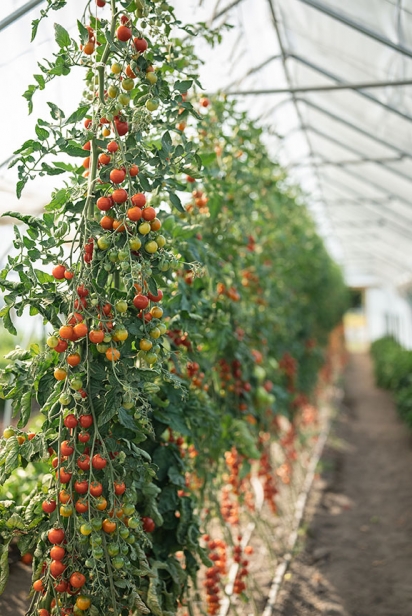From Horses to Farm-Fresh Produce
At 83 years old, most people might be enjoying retirement, but not my dad, Sydney Belzberg. After a 57-year career in the rental car business, most of that as CEO of Budget B.C., Belzberg finally quit, but his retirement would be short lived. One morning, he read an article in the newspaper that detailed the number of children in British Columbia who go to school each morning without breakfast. That got him thinking.
“A couple weeks after learning about the number of people living with food insecurity in Canada, I decided to convert my horse farm to an organic produce farm,” Belzberg says.
The horse farm, once known as Budget Stables, is a 65-acre property in Langley, B.C. that Belzberg purchased in 1980. Heavily involved in the horse racing industry at the time, Belzberg outfitted the property with barns, a race track, breeding facilities and a dressage and jumping arena.
“I also renovated a house on site so I could spend time away from the city,” Belzberg says. At one point, Budget Stables housed 60 thoroughbreds and staffed eight people, including grooms, jockeys and a horse trainer.
In 2004, Belzberg moved his horses to California and retired the farm, though decided not to sell it. “I felt it was so beautiful and that one day we would do something with it, whether that was doing something again with horses or turning it into a park for family and others to enjoy.”
That decision turned out to be a fateful one, because when he realized he could help bridge the gap between getting fresh produce to people living with food insecurity, he had the perfect place to do it: the farm.
While Belzberg had no prior experience in the agriculture industry, he felt confident he could pull it off. “I knew if I could operate three businesses for over 50 years, I could run a successful produce farm with the right team, some of my own resources and God giving me more time to fulfill,” he says.
Soon after the farm, renamed Stable Harvest Farm, began to come together, Belzberg was introduced to Coastal Roots, a nonprofit farm in Encinitas, CA., embedded with Jewish traditions and agricultural practices. “It immediately reminded me of my life growing up on a farm in Lethbridge, Alberta,” Belzberg adds.
With the help of farm manager Kristjan Johannson and with Coastal Roots as inspiration, Belzberg started to plan out the farm’s infrastructure. Now in its fourth year, Stable Harvest Farm includes a seven-acre market garden, a retrofitted barn where thoroughbreds were once stabled, seven greenhouse tunnels, three commercial washing stations, two 6000-litre water tanks, two coolers, seven freezers, a chicken coop with 22 hens and three roosters and a racetrack whose inside was recently planted with 300,000 sunflower seeds and 12 pounds of clover.
“The goal is to have nitrogen fixation from the clover build organic matter from the biomass of the sunflowers and create a pollinator corridor from the pollen produced by both plants’ flowers,” Johannson says.
While Stable Harvest is not certified organic, the farm adheres to organic principles, meaning no synthetic pesticides, herbicides or fertilizers, minimal tilling and prioritizing crop rotation and crop covering. “There’s not a lot of incentive for us to certify at our scale,” Johannson says, “as we’re primarily an education based farm producing food for charitable outlets.”
Education is currently the main focus of Stable Harvest Farm with more than 5,000 students visiting the farm between May and October last year. This is more than double the number of students who visited the farm in 2022, and Belzberg only sees the educational component growing.
“From the inception of the farm, I realized with our location being so central we could start to introduce kids to the farm and it was an instant success,” Belzberg says.
Workshops that cater to Grades 1 to 11 are on topics such as the origins of staple foods — potatoes, corn and quinoa — or how to grow your own sunflowers at home. Additionally, the Jewish Biblical Garden, created by Belzberg’s friend David Bogoch aims to teach Jewish agricultural practices, many of which also align with organic principles.
“It’s going back to the way things were done thousands and thousands of years ago,” Belzberg says.
Of the seven biblical plants, Stable Harvest grows four, including figs, wheat, barley and grapes (the remaining produce include dates, pomegranates and olives, which require a Mediterranean environment). One Jewish agriculture tenet that is put into practice at Stable Harvest is orlah, which forbids farmers from harvesting the fruit that is produced from a tree for three years; on the fourth year, the fruit is given to the poor; on the fifth year, the fruit can be eaten.
During an educational tour with students from King David High School last year, Bogoch dons a Stable Harvest vest and explains how these Jewish practices are put into practice at the farm. He points out where the figs are growing on the edges of the property and how the grapes will be planted to trail up an arbour. “One last thing before I send you off,” he says, wrapping up the tour. “At the edges [of the garden], you’ll see things that shouldn’t be growing. Just pick one, then throw it on the ground for me and you’ve done your mitzvah for the day.”
Along with the farm serving the community’s needs, it also aims to help migrating birds. Currently, 55 species of birds have been seen on the farm, including cinnamon teals that breed on the farm’s pond in springtime. There are also several species of mammals, including skunks, muskrats, coyotes and, says Johannson, “a family of beavers on the back creek that we have been monitoring with wildlife cameras.”
The farm has recently installed several bird houses and hopes to support birds at the end of the season, when sunflowers will be left so birds can harvest their seeds.
While Stable Harvest has been successful within its first few years, Belzberg acknowledges that there have been hard times and, as he calls them, “acts of God,” such as flooding or heat waves that have destroyed crops. Despite these difficulties, he takes faith in his past work of managing the ups and downs of several businesses.
“Operating and building a business, whether at Car Rental, Park ’N Fly, Mini Storage or Stable Harvest Farm, is really all the same — they are all about building a brand and staying true to the company mission statement,” he says. “They all require a team effort, building a strong dedicated staff.” That staff currently includes a full-time team of eight people, though the number fluctuates depending on the season. This year, Stable Harvest has begun to recruit volunteers to help with harvesting and freezing produce, running the Saturday farm market, delivering food and assisting in educational programs and farm tours.
Until recently, Belzberg admits that he lacked an appreciation for farming and the difficulties of growing pesticide-free food. Even the taste of farm-fresh produce is growing on him. “I was never fond of veggies, but I must admit because of our wonderful farm-grown food, I’m now almost totally a believer,” he says.
Stable Harvest Farm has donated approximately 340,000 pounds of produce to organizations such as Langley Meals on Wheels, Christ Church Cathedral, Richmond Food Bank, Sources Food Bank, Langley Hospice Society and Cloverdale Community Kitchen. Additionally, the farm has partnered with B.C. Agriculture and Talmud Torah to offer various educational workshops, including programs on harvesting, beekeeping, planting and the cycle of life.
Stable Harvest Farm
5848 216 St., Langley, B.C.
stableharvestfarm.com | 604.765.2286 | @stableharvestfarm


